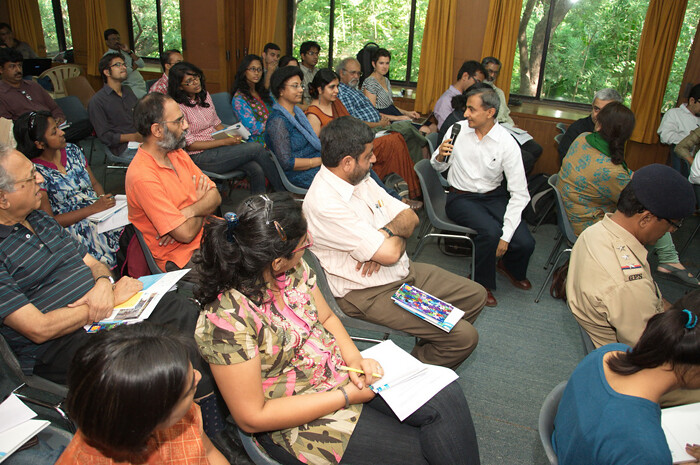Workshop held on “Ahmedabad‟s Parking Puzzle: Ideas for Sustainability”
October 08, 2011

Ahmedabad, 8 October, 2011
parking problems and policymakers should take a holistic view of the situation before framing regulations for the purpose. Not only that, all the experts who attended the workshop on “Ahmedabad’s Parking Puzzle: Ideas for Sustainability” agreed that the city should learn from the experience of the other major cities in the world and localize in order to find out solutions to it ever growing parking woes.
The workshop was organized by Institute for Transportation & Development Policy (ITDP) and Center for Environment Education (CEE) in association with Bakeri Urban Development Private Limited at the CEE campus in Ahmedabad.
While speaking at the workshop, Dr. Walter Hook, Chief Executive Officer of ITDP, said, “The city is motorizing fast. But is this a parking problem or a social problem with a parking solution? Parking is a tool to manage social problems like air pollution and traffic congestion. We have two approaches to deal with the parking problem – traditional approach and new European approach. The latter one is more suitable as it has some most appropriate provision like supply caps, linking parking space to public transit, limit on parking capacity building by an individual developer and so on,”
“Ahmedabad has a huge opportunity, as there is a lot of real estate development along the BRTS corridor right now. The state should consider modifying the parking regulations in this area to reduce the parking requirement. People in this area have a good transit option and reducing the parking will help meet the city‟s goals to reduce traffic congestion.”
Hook went on to talk about on-street parking. “Enforcement of on-street parking is always a challenge, police are underfunded, but cities must realize that parking is a revenue source. If you charge for on-street parking you can generate revenue for things like public transport, as they have done in London or bicycle sharing, like in Barcelona. Pasadena, California uses parking revenue to pay for street improvement, security, and maintenance.”
Shri M. M. Anarwala, Deputy Commissioner of Police, Ahmedabad Traffic Police, said, “Ever-rising number of vehicles, poor traffic behavior, encroachment on foot-paths,parking in front of shops and extension of shops on to roads are real causes of parking problems face by the city. Therefore we should learn from the experience of the other cities which already went through these problems.”
“We can identify a street for a model pilot project on better parking management involving all the key stakeholder and the interventions can include, Cycle sharing, Pedestrian only streets/ zones, Park and ride facilities, Creating public open spaces, tree plantations, street furniture and footpaths protected from encroachment”
Pavan Bakeri, managing director of Bakeri Group while speaking on „parking requirements in private development: conflicts & opportunities, said, “What is really needed is not more parking. It is better transport options, like BRTS. Then people would not need to drive so much. Right now we are providing parking spaces and they are not always even filled, but it is something that every developer feels like that they have to offer to make their developments more attractive,”
There were more than 60 participants attending the consultation, Ms Shreya Gadepalli, Regional Director, ITDP, said, “The consulation is to engage with various stakeholders of the city over sustainable solutions for parking in the city. The event focussed on principles of parking policy, challenges in enforcement and management of parking rules, issues of equity and right of space for varied activities and parking, and opportunities for reform. The outcomes and recommendations of this consultation would be a step towards formulation of a comprehensive parking management framework that may become a model for other cities.
Earlier setting tone for the workshop, Shri Kartikeya Sarabhai, Director, CEE, said, “Ahmedabad really wants to do something to put an end to its parking problems and I hope discussions, to be held here as a part of this workshop, will go a long way in finding out the solutions. It will also enable us to learn lessons from the experience of the other major cities in the world.”
Recent Stories
- ACB Gujarat files offence against SK Langa and son for disproportionate asset
- Kshatriya agitators announce part-2 programs in Gujarat
- FM Sitharaman on Gujarat visit on April 20th
- JNK India Limited’s IPO to open on April 23rd
- CR Patil files nomination papers from Navsari Lok Sabha seat
- Miscreants attempt to vandalize BJP office in Rajkot
- Amit Shah files nomination papers for Gandhinagar Lok Sabha seat
